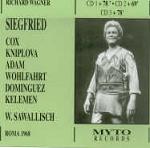The main reason for owning this Siegfried is for the work of tenor Jean Cox in the title role. Ignored by the record companies, the American Cox appeared at Bayreuth in the late-’60s and ’70s but mostly as Lohengrin, Parsifal, and Erik; he eventually sang Siegfried and Walther von Stolzing and had a fine European–mostly German–career until the early 1980s, after which he seems to have disappeared. The voice is a true Heldentenor, big and full, seemingly tireless. He has no trouble at all in the big last-act duet with Brünnhilde after an evening of quite impressive–and always on pitch–singing. Perhaps there’s a Götterdämmerung available with him? He may not be the most insightful (Windgassen) or thrilling (Melchior) Siegfried, but it’s good to feel comfortable with a singer who is absolutely secure and making fine sounds at the same time.
Wolfgang Sawallisch leads the Rome RAI forces in a thoroughly un-eccentric reading. He contrasts the dark and light moments well, and considering that he’s not dealing with a Wagnerian orchestra (Furtwängler’s undertaking notwithstanding), Wagner’s music drama flows naturally and dramatically. He doesn’t underline the score’s craziest moments–Alberich/Mime; Mime’s death–but the introspective parts of the score are as well performed as the grand ones.
Theo Adam is in terrific voice as the Wanderer, singing comfortably at Sawallisch’s quickish tempos and impressively in his several duets. Wohlfahrt’s Mime is actually sung–there’s precious little mugging. As ever, Zoltan Kelemen’s Alberich is a nasty little thing, and Karl Ridderbusch is a good Fafner. Oralia Dominguez sings Erda with the right seriousness. Nadezda Kniplova must have been exciting on stage–her sound is big and warm, and every note up to and almost including her two high-Cs is exciting and solid. She lacks any individual stamp, however. Ingrid Paller as the Woodbird is second-rate. There are a handful of better Siegfried recordings on the market, but this one has Cox and little to be ashamed of.
































